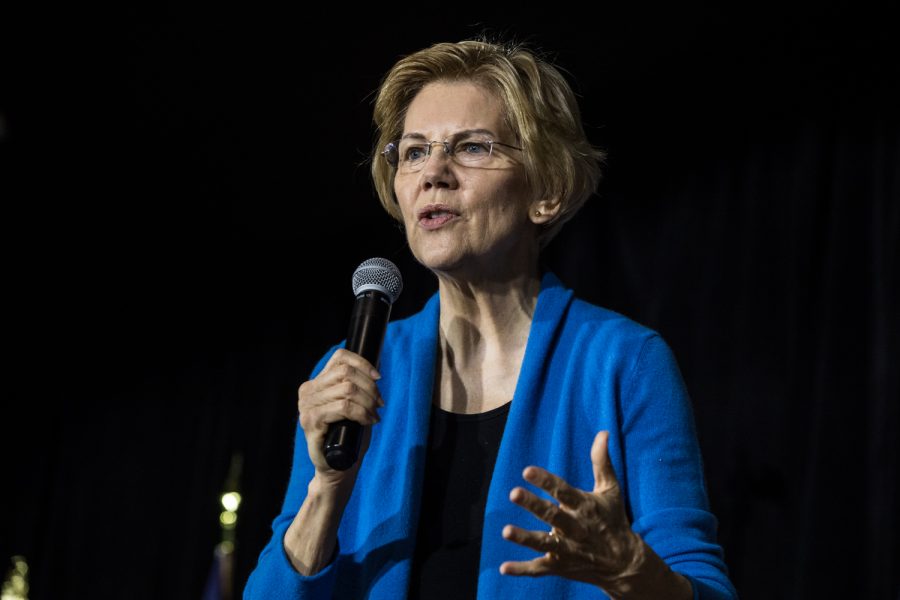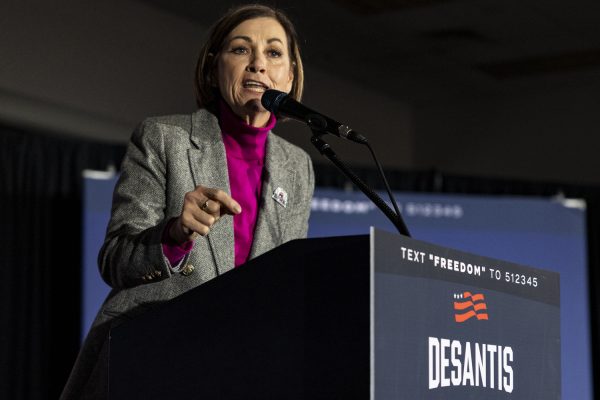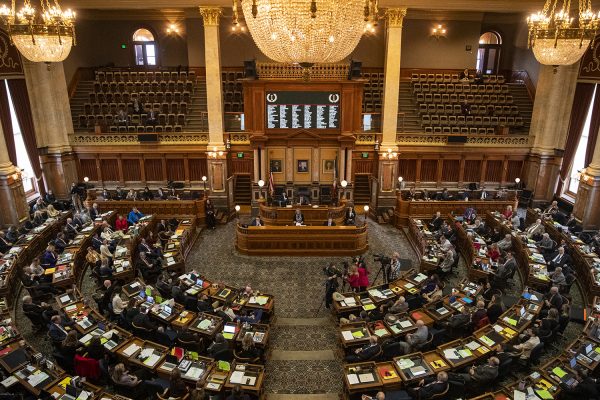Elizabeth Warren proposes student-debt cancellation, free tuition
In a policy proposal released Monday, Elizabeth Warren outlined her plan to implement universal free college and up to $50,000 of student-loan debt cancellation.
Sen. Elizabeth Warren, D-Mass., speaks during a campaign rally in Cedar Rapids on Sunday, Feb. 10, 2019.
April 22, 2019
Massachusetts Sen. Elizabeth Warren, Democratic presidential hopeful, is proposing universal free college and up to $50,000 in student-debt cancellation for 42 million people.
Under her proposal, those with a household income of $100,000 or less would have a maximum of $50,000 worth of debt canceled. For every additional $3 of a person’s income, the maximum debt canceled would be reduced by $1, so an annual income of $130,000 would receive $40,000 in debt canceled. People with incomes above $250,000 would not be eligible.
On a conference call with reporters, Warren called her proposal an answer to rising student debt, which she said is “weighing on the economy.”
“There’s been no efforts to help families with the rising cost of college, and it’s forced whole generations of students to take on huge amounts of debt,” Warren said.
The amount of students with student-loan debt in Iowa increased 77 percent from 2008 to 2018. In Iowa, 63 percent of those graduating in 2017 had some amount of student loan debt. The average amount of debt was $29,859, according to the Institute for College Access and Success.
Warren’s plan, which does not have a legislative companion at this time, would provide complete debt cancellation for more than 75 percent of students with student-loan debt, according to her policy proposal. Her plan also proposes $50 billion earmarked for historically black colleges and universities and minority-serving institutions, cuts federal funds for for-profit colleges, and expands Pell Grants.
The plan would be paid for with a proposed wealth tax, which would add an additional 1 percent on wealth above $1 billion and an added 2 percent on wealth above $1 billion.
The debt-cancellation plan would happen automatically for most people through data already available to the federal government, and private student-loan debt would also be available for debt cancellation. The canceled debt would not be taxed as income, according to Warren’s policy proposal.
On the conference call and in a Medium post documenting her proposal, Warren explained the student-debt policy dovetails with her proposal eliminating tuition for all two-year and four-year public schools. She wrote in the post on Medium that it structurally changes how students pay for college and “mak[es]” sure nothing like this ever happens again.”
Warren does not have a legislative companion at this time, Warren’s Iowa press secretary Jason Noble said in an email to The Daily Iowan.
On the conference call, Bharat Ramamurti, a policy aide on the Warren campaign, said the proposal had broad swaths of support and that the campaign was “optimistic” about the proposal’s chances of passing once it is introduced in Congress.
“This is something we will be pushing aggressively for the next year or two years, and our hope will be that … when she’s president in 2020 it will be something that will be at the top of the agenda in Congress,” said.
The policy release comes ahead of a series of back-to-back televised CNN town halls Monday night in which five candidates plan to address how they want to appeal to young voters.
Sen. Bernie Sanders, Democratic presidential-nomination candidate, also proposed a universal free-college policy, known as the “College for All Act.” Sanders’ plan would grant $47 million a year to states to eliminate tuition costs for undergraduate tuition and fees.
The College for All Act would also lower student-loan interest rates, rather than eliminate student debt like Warren’s plan. Sanders’ plan would cut interest rates from 4.32 percent to 2.32 percent and would ensure interest rates would never exceed 8.25 percent.
Warren’s campaign has touted “big, structural change” to government and economic policy, making detailed policy plans a key part of her run for the White House, including a plan to demonopolize the technology industry by taxing the wealthiest 1 percent.
Warren connected the policy proposal to her background getting a degree from a commuter college after she got married.
“Higher education opened a million doors for me. It’s how the daughter of a janitor in a small town in Oklahoma got to become a teacher, a law school professor, a U.S. Senator, and eventually, a candidate for President of the United States,” she wrote in the Medium report.
During Warren’s Iowa City visit in February, she addressed the issues of rising tuition and student debt, pointing out that in 2018, students collectively borrowed $1.5 trillion —the same amount the Trump administration gave out in tax cuts.
Warren also visited Cedar Rapids and Davenport in February, where she called for a higher minimum wage and breaking up wealthy corporations. Warren will visit Cedar Rapids again on Thursday and Tipton on Friday.
Sarah Watson contributed to this report.














